Edmund was a graver and quieter man than Peter, and great in council and judgment. He was called King Edmund the Just.
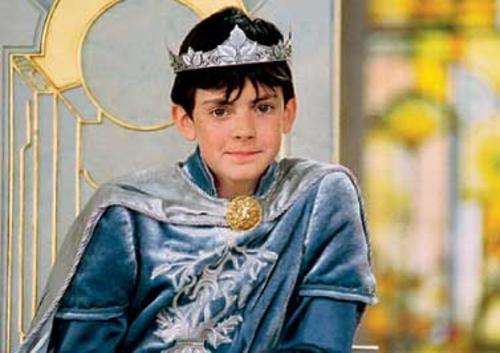
Edmund is, without question, my favorite of the four. His story is the story of redemption. And it’s beautiful. I have so many wonderful quotes about him that this post is going to get rather lengthy. But you don’t mind, right? 😊
It’s abundantly clear that redemption is the focus of this wonderful character. Without redemption Edmund was only capable of being one of the Witch’s helpless subjects. Without the Lion he would have died. But Aslan doesn’t abandon him to what would have been just and deserved punishment. Instead, he graciously and miraculously redeems and forgives. But before I begin to ramble unceasingly, let’s look at this miracle straight from the book.
From the beginning we can see that this particular Son of Adam isn’t going to be the most pleasant of people. After a few chapters Edmund has already eaten with the White Witch herself. He’s enjoyed her flattery and has put his trust in her false promises. Look at these two promises: an endless source of satisfaction and pleasure (Turkish delight to be specific), and kingship. By the time Aslan is first mentioned, Edmund is fully on the Witch’s side, and willingly so. Nothing in him desires to know this Lion. Look at how Jack, our dear friend and author, describes Edmund’s reaction to the news of Aslan’s arrival.
Edmund felt a sensation of mysterious horror. -The Lion, the Witch, and the Wardrobe
That doesn’t sound like delight, hope, or anticipation. Edmund is wholeheartedly indulging in darkness and doesn’t want the light. (But to tell the truth, he isn’t truly enjoying it. Quite the contrary, it’s making him perfectly miserable.)
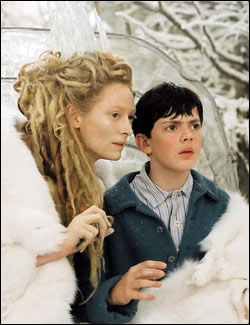
“I say,” said Lucy, “you do look awful, Edmund. Don’t you feel well?” “I’m all right,” said Edmund, but this was not true. He was feeling very sick. -The Lion, the Witch, and the Wardrobe
The pleasure of Turkish delight and the thrill of being promised a throne are so short lived, but these things are all he can think about.
And now we come to one of the nastiest things in this story. Up to that moment Edmund had been feeling sick, and sulky, and annoyed with Lucy for being right, but he hadn’t made up his mind what to do. When Peter suddenly asked him the question he decided all at once to do the meanest and most spiteful thing he could think of. He decided to let Lucy down. -The Lion, the Witch, and the Wardrobe
This is Edmund. He is wholly miserable and thirsting for more of the Witch’s flattery and food. You can see where his thoughts run when the children find Tumnus the Faun’s little dwelling wrecked and ruined. Lucy is desperate to find her friend, while Edmund coolly observes,
“A lot we could do!” said Edmund, “when we haven’t even got anything to eat!” -The Lion, the Witch, and the Wardrobe
I can’t help but wonder if he is thinking of Turkish delight. Actually, I bet a billion bucks that he is. The pleasure of sin looks so appetizing, and Edmund can’t resist the temptation on his own. By constantly dwelling on the thought of Turkish delight every waking hour, Edmund is practically eating the Witch’s food nonstop.
It’s not until after a long period of self-centered thought that something like regret starts to appear. Finally, the boy begins to feel a little prick of conscience. Everything has gone wrong and he is now riding along in the White Witch’s sleigh, not like an honored guest but very much like a prisoner. The Witch has just turned some woodland creatures into statues and Edmund tried to protest. For this slight attempt at doing right he is slapped in the face. Then the book says:
And Edmund for the first time in this story felt sorry for someone besides himself. -The Lion, the Witch, and the Wardrobe
This is all he is capable of, a slight bit of remorse. But it is too late. He can’t save himself or the small stone creatures. He has given himself over to the Witch and now she is destroying him. When the White Witch finds out that the other three Pevensies have already found the Lion, she does the only thing that any sensible wicked woman would do. Without Edmund, Aslan’s plan is all to no avail.
“Prepare the victim,” said the Witch. And the dwarf undid Edmund’s collar and folded back his shirt at the neck. Then he took Edmund’s hair and pulled his head back so that he had to raise his chin. After that Edmund heard a strange noise – whizz whizz – whizz. For a moment he couldn’t think what it was. Then he realized. It was the sound of a knife being sharpened. -The Lion, the Witch, and the Wardrobe
Edmund faces death and he can’t fight it. He is going to die knowing that he submitted to evil and shunned good. In a way, by eating that first bite of Turkish delight Edmund submitted to his own death. He can’t save himself.
But then. Mercy. Aslan sends rescue. Aslan. The one he mocked and hated and ran from. Having practically chased the rebel down, Aslan has come not to destroy him, but to restore him. What has Edmund done to deserve this? I can’t think of anything. He hadn’t even called out for help. He wasn’t even able to. But Aslan loved him and so Aslan called to him.
Imagine the meeting between the two. The rebel and the Redeemer. The sinner and the Savior.
There is no need to tell you (and no one ever heard) what Aslan was saying, but it was a conversation which Edmund never forgot. As the others drew nearer Aslan turned to meet them, bringing Edmund with him. -The Lion, the Witch, and the Wardrobe
“Bringing Edmund with him.” I absolutely LOVE that. And I don’t think I have to explain why.
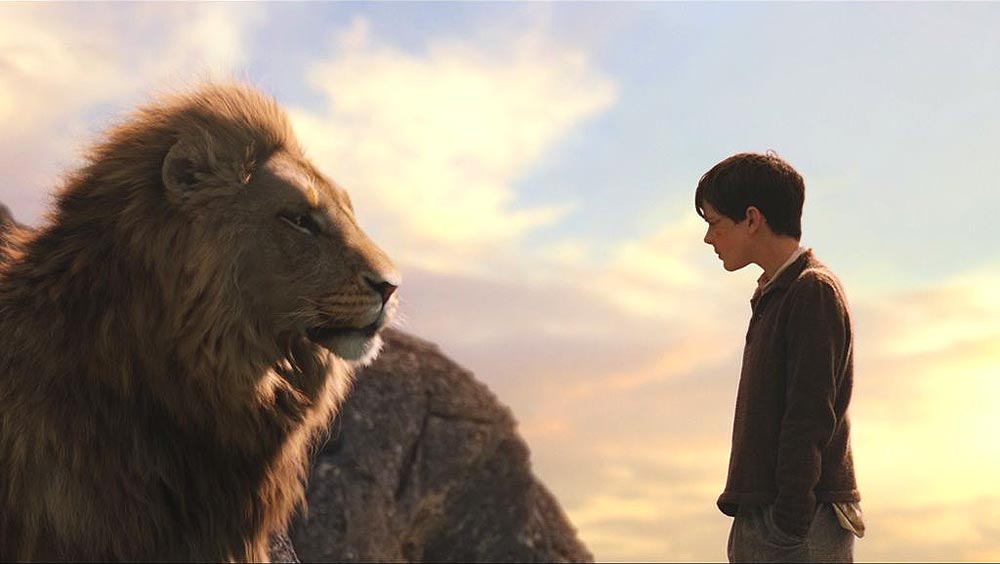
The next morning the White Witch comes to claim Edmund, and she thinks she has a legitimate claim. This Lion of light has no dealings with children of darkness. This Son of Adam has lived for her and has sacrificed all (even his own family) in hopes of obtaining her false promises. She has every reason to demand the return of the boy.
“You have a traitor there, Aslan,” said the Witch. Of course everyone present knew that she meant Edmund. But Edmund had got past thinking about himself after all he’d been through and after the talk he’d had that morning. He just went on looking at Aslan. It didn’t seem to matter what the Witch said. -The Lion, the Witch, and the Wardrobe
Don’t you see the perfect contentment and trust in this response? Nothing matters to Edmund but Aslan, the Lion who forgave and redeemed him. He is confident that no one, not even the most powerful enemy, can remove him from the Lion’s great love. The Witch makes a strong legitimate case for his return to darkness, but without a thought for the Witch Edmund looks to Aslan .
Edmund was on the other side of Aslan, looking all the time at Aslan’s face. He felt a choking feeling and wondered if he ought to say something; but a moment later he felt that he was not expected to do anything except to wait, and do what he was told. -The Lion, the Witch, and the Wardrobe
(Take just a moment and fully appreciate what you just read. It’s gorgeous.)
I find it interesting that Edmund isn’t told to go and do anything to make the situation better or to rectify the past. The work that has to be done to fully redeem him from the Witch’s hold can only be done by Aslan. Ultimately, the Witch requires death. The death of the traitor is needed for justice to be appeased, and so Aslan took the punishment of the traitor on himself. Aslan laid down his own life in Edmund’s place. But he not only died for Edmund, he also came back for Edmund.
“…Though the Witch knew the Deep Magic, there is a magic deeper still which she did not know: Her knowledge goes back only to the dawn of time. But if she could have looked a little further back, into the stillness and the darkness before Time dawned, she would have read there a different incantation. She would have known that when a willing victim who had committed no treachery was killed in a traitor’s stead, the Table would crack and Death itself would start working backwards.” -The Lion, the Witch, and the Wardrobe
(Just pause again and maybe read that quote again. Because it is just so good.)
The final battle in The Lion, the Witch, and the Wardrobe shows a new side of Edmund. He’s fighting. He’s fighting his old enemy with everything he has. He’s determined not to submit again. But as Edmund fights, he’s mortally wounded and taken from the fighting line. The battle is hopeless without the Lion, and they all seem to know it.
And then…
“Off my back, children,” shouted Aslan. And they both tumbled off. Then with a roar that shook all Narnia from the western lamp-post to the shores of the eastern sea the great beast flung himself upon the White Witch. Lucy saw her face lifted towards him for one second with an expression of terror and amazement. Then Lion and Witch had rolled over together but with the Witch underneath…” -The Lion, the Witch, and the Wardrobe
Haha! Triumph! The Witch could not defeat him! I can’t tell you how much I love that.
As for Edmund…
“They found Edmund in charge of Mrs. Beaver a little way back from the fighting line. He was covered with blood, his mouth was open, and his face a nasty green colour.” -The Lion, the Witch, and the Wardrobe
Edmund is facing death for the second time in the story. But how different from the first! He was fighting the enemy and not serving it. The love of the Lion was burning in him, not the love of self. What a beautiful transformation. And when Lucy heals his body with the cordial, I think that’s when Aslan completes the rest of his healing.

“When at last she was free to come back to Edmund she found him standing on his feet and not only healed of his wounds but looking better than she had seen him look – oh, for ages; in fact ever since his first term at that horrid school which was where he had begun to go wrong. He had become his real old self again and could look you in the face. And there on the field of battle Aslan made him a knight.” -The Lion, the Witch, and the Wardrobe
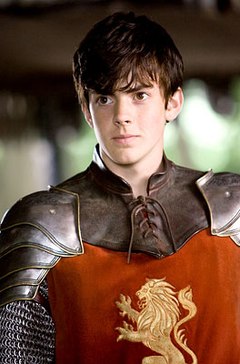
I know this picture is from Prince Caspian… but I couldn’t help it.
I can only imagine that at that moment Aslan said to Edmund what he was to say later in Prince Caspian.
“Then he turned and welcomed Edmund. “Well done,” were his words.” -Prince Caspian
Well done.
*Shivers with all the appreciation ever*
Edmund is called the quieter one of the two Pevensie brothers, and it makes sense. He’s constantly remembering what Aslan has done for him and it gives him a graver demeanor. We see a little glimpse of this in The Horse and His Boy. A matter is brought before the royal assembly in Archenland. What are they to do about Prince Rabadash? He’s a most traitorous fellow. Personally, I think Edmund saw much of himself in the Prince. And then we hear his response.
“It is very true,” said Edmund. “But even a traitor may mend. I have known one that did.” And he looked very thoughtful.” -The Horse and His Boy
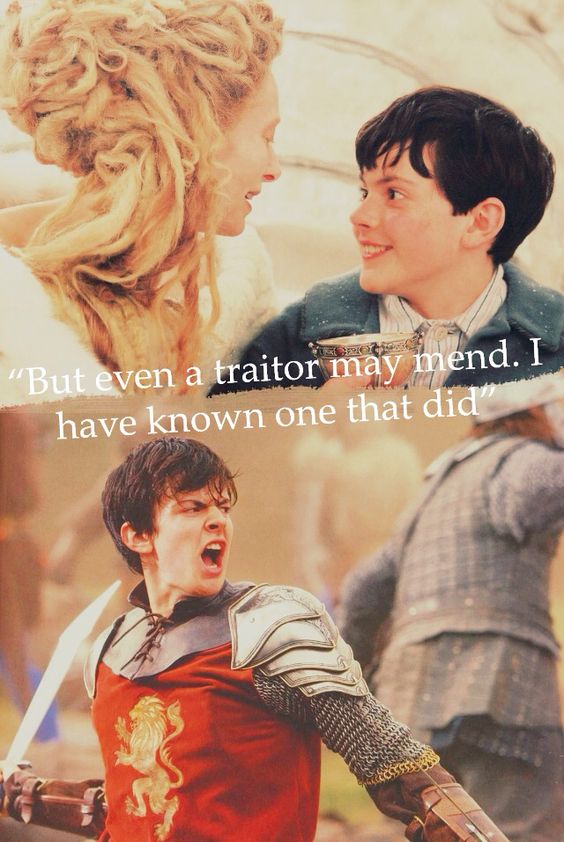
Love,
Hannah Jo <3

rebeccamcclurg
I would LOVE to see Edmund’s character traced through Prince Caspian and Voyage of the Dawn Treader too!